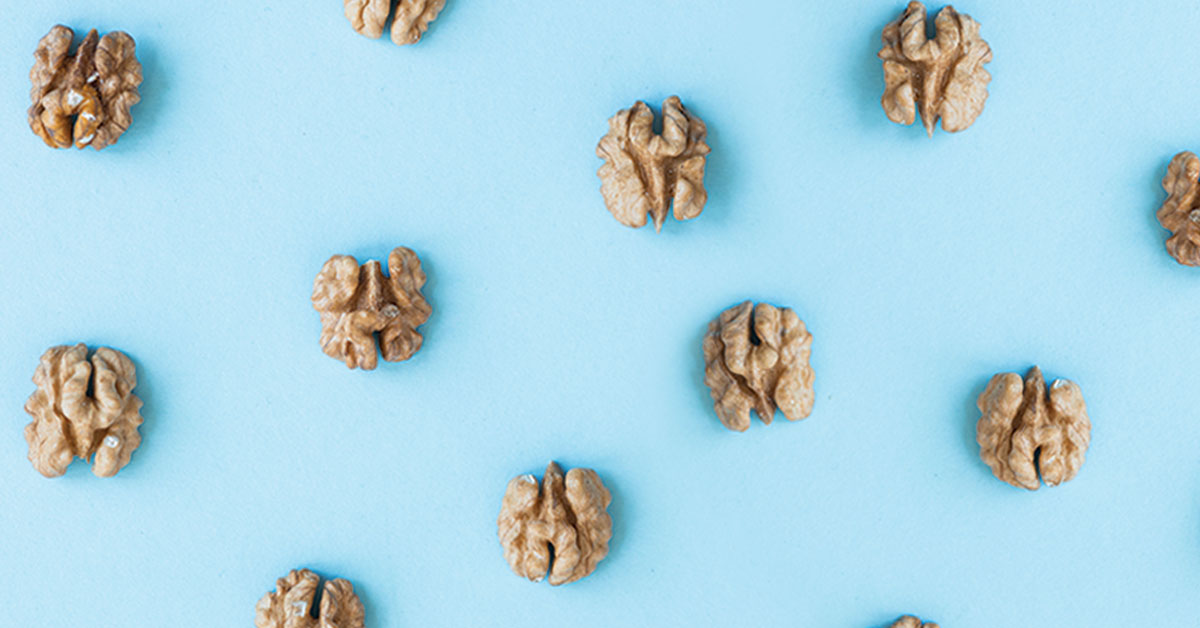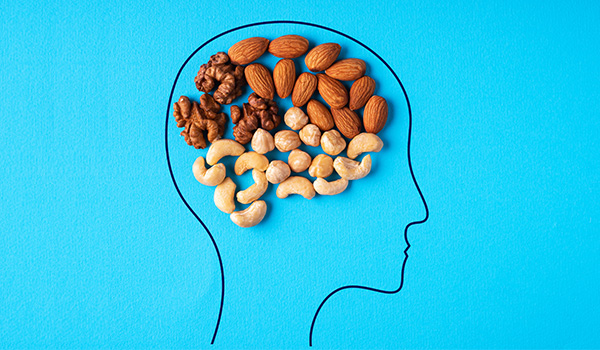





When it comes to a brain-healthy diet, nuts are high on the list of things to eat. They help protect your memory, support communication between nerve cells, and keep your brain sharp with age. Brainy people go nuts for these tree-born treats! So, make sure to eat these five best nuts for the brain.
There are dozens of nut varieties out there. So which nuts should you eat to keep your brain healthy? Keep reading to find out!
Have you ever noticed that a walnut closely resembles the shape of our brains? It’s pretty cool that this round tree nut not only looks like our noggin. It’s also one of the best foods for a healthy brain. Why? Walnuts contain omega-3 fatty acids, a major building block of the brain. Omega-3 also supports learning and memory.
We’ve got even more reasons to eat walnuts. A study observed the effects of eating mixed nuts, including walnuts, on cognition and gut health. Volunteers ages 18 to 49 ate 30 grams of nuts each day for four weeks (15 grams of walnuts, 7.5 grams of hazelnuts, and 7.5 grams of almonds). At the end of the study, participants saw significant increases in reaction time and their ability to recall pictures, numbers, and words.
Want a boost of brainpower? Try adding pistachios to your regular diet. Researchers are calling pistachios a “superfood.” A study found that pistachios enhance brainwave frequencies associated with cognition, learning, memory, recall, and other key functions. Specifically, they produce a gamma wave response, which is critical for enhancing cognitive processing, information retention, and learning.
Another study found that walnuts reduce the effect of stress on the brain. University students who ate just half a cup of walnuts each day felt less stressed. Plus, they enjoyed more restful, quality sleep. In other words, consuming walnuts when under pressure can help improve well-being, reduce the effects of stress on the brain, and help you feel more energized.
Get a dose of these brain healthy nuts by adding them to a salad or as a healthy midday snack. They also make an excellent better for crusted salmon or chicken.
If you want to keep your brain healthy as you age, eat more almonds. A study observed the impact benefits of almonds among elderly adults. Participants who ate three ounces of almonds each day saw significant improvements in memory. That’s because almonds contain lots of brain-boosting ingredients.
Almonds have vitamin E, an important antioxidant shown to protect the brain against oxidative stress. The L-carnitine in almonds helps flush the brain of toxins and reduce inflammation. A study also found that the riboflavin in almonds helps protect the brain against the negative impacts of stress and inflammation.
Almonds also support a healthy gut microbiome. You might not think of the gut when it comes to protecting your brain, but scientists actually consider the gut a “little brain.” The big brain in your head and the little one in your gut constantly talk to each other through millions of nerves. That connection means keeping the gut healthy helps keep your brain healthy, too.
Hazelnuts come packed with nutrients to keep your mind sharp. The vitamins and minerals in hazelnuts help defend the brain against free radical damage. Similar to almonds, hazelnuts contain high levels of vitamin E—which supports a healthy brain as you age and fights inflammation. Manganese, an essential trace element, stimulates faster thinking and brain function. The folic acid in hazelnuts also supports brain development in pregnant women and slows age-related decline.
Macadamia nuts are rich in vitamins, minerals, fiber, antioxidants, and healthy fats—ideal ingredients for a healthy brain. They contain copper, magnesium, and manganese, which help maintain healthy neurotransmitters. These messenger chemicals help carry signals between nerve cells, key for memory and quick thinking.
So how many nuts should you eat? The Cleveland Clinic recommends one ounce of nuts per day (14 walnuts, 49 pistachios, 24 almonds, 12 hazelnuts, or 12 macadamia nuts). Repackaging servings into small containers or bags can help you get the right amount without overeating.
Nuts have all kinds of benefits, especially when it comes to your brain. These versatile foods taste great prepared in all kinds of ways—raw, in a paste, roasted, or as an ingredient in a range of recipes. Or why not make a trail mix and enjoy the benefits of all?

When it comes down to it, you can benefit from eating any of these nuts in your regular diet. Walnuts pack a huge amount of brain-healthy nutrients. Studies show that eating mixed nuts, like those mentioned here, will help keep your brain healthy for a lifetime.
That said, it’s not easy to get every nutrient you need from diet alone. That makes supplementation a crucial part of living a healthy life. Get the essential ingredients you need to feel your best with NeuroQ Daily Essentials. It’s a first-of-its-kind multivitamin that supports brain health and well-being.
Take advantage of our hassle-free monthly auto-ship program to ensure that you never go a day without your favorite brain boosting NeuroQ formula. You can cancel your monthly auto-ship at any time.
As a member you can expect: